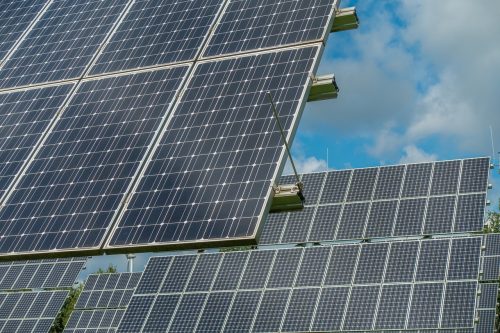In 2017, the world invested in solar like never before, according to a new global trends report.
Driven largely by China, global solar investment was $160.8 billion, up 18 percent on the year before.
 More than half of last year’s solar investment came from China. Image: pixabay-2742305
More than half of last year’s solar investment came from China. Image: pixabay-2742305
Harnessing energy from the sun to make electricity accounted for more than half (57 percent) of the $279.8 billion that was invested in renewables in 2017 and far outstripped the $103 billion invested in coal and gas generation.
More generating capacity
According to the recently released Global Trends in Renewable Energy Investment 2018 report, the world also installed more new generation capacity from solar in 2017 than any other renewable, or the net additions from fossil fuels and nuclear. Net addition is the difference between new and decommissioned capacity.
A record high of 157 gigawatts of generation capacity from renewables came on stream in 2017. Of this, more than a third (38 percent) was due to new solar capacity, which also hit a record high of 98 gigawatts.
The report, which was produced by the United Nations Environment Program (UNEP), the Frankfurt School of Finance and Management, and Bloomberg New Energy Finance, defines investment in renewables as investing in projects that make electricity from solar, wind, biofuels, biomass, waste, geothermal, hydropower (up to 500 MW), and marine (that is, wave and tidal).
It drew most of its data from the online Bloomberg New Energy Finance database, which contains worldwide information on projects, investors, and deals relating to clean energy.
‘Global renewable energy revolution’
As a result of $2.7 trillion in global investments during 2007-2017, the proportion of the world’s electricity generated by renewables has risen from 5.2 to a significant 12.1 percent.
“We are in the middle of a global renewable energy revolution,” says the report.
The renewable energy market is pushing ahead at a “remarkable” rate. 2017 is the eighth successive year in which global investment in renewables has topped $200 billion.
While falling costs of solar electricity, and to some extent, wind as well, are likely the main reasons for this sustained level of investment, the main driver of solar investment last year was China.
China accounted for more than half of global solar investment ($86.5 billion) and installed solar capacity (53 gigawatts) in 2017.
“The extraordinary surge in solar investment,” says Erik Solheim, Executive Director of UNEP, “shows how the global energy map is changing and, more importantly, what the economic benefits are of such a shift.”
In this context, ‘economic benefits’ refers to the overall economy rather than an individual firm.
More jobs, less pollution
Invest in renewables increases employment, not only of total jobs, but also of higher quality, better paid jobs.
“Clean energy also means less pollution, which means healthier, happier development,” says Solheim.
The amount of global electricity that is now produced by renewables has had a big effect on cutting emissions.
The report estimates that it has prevented around 1.8 gigatonnes of carbon dioxide emissions, which is about the same as that generated by the whole of the transport system in the U.S.
In addition to solar investment, China also made huge investments in other renewables in 2017. Overall, it was the biggest investor, and put in a record $126.6 billion, which is 31 percent more than the year before.
Australia, Mexico, and Sweden also vastly increased their investment in renewables in 2017.
Some slumps in investment
However, 2017 saw a slump in investment in some of the large markets for renewables. For example, in the United States it fell by 6 percent, while in Europe it fell by 36 percent and in Japan by 28 percent.
The report puts some of this down to timing of projects, whose financial timescales do not necessarily fall neatly into yearly parcels.
